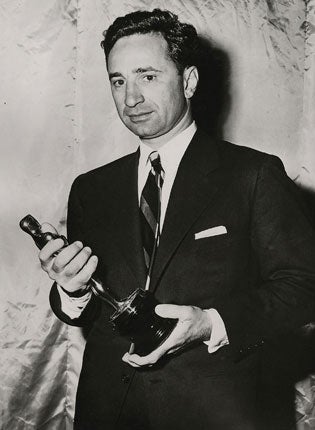First Night: A Letter To Elia, Venice Film Festival
Scorsese on communists and prostitutes' sons

Your support helps us to tell the story
From reproductive rights to climate change to Big Tech, The Independent is on the ground when the story is developing. Whether it's investigating the financials of Elon Musk's pro-Trump PAC or producing our latest documentary, 'The A Word', which shines a light on the American women fighting for reproductive rights, we know how important it is to parse out the facts from the messaging.
At such a critical moment in US history, we need reporters on the ground. Your donation allows us to keep sending journalists to speak to both sides of the story.
The Independent is trusted by Americans across the entire political spectrum. And unlike many other quality news outlets, we choose not to lock Americans out of our reporting and analysis with paywalls. We believe quality journalism should be available to everyone, paid for by those who can afford it.
Your support makes all the difference.In April 1952, the film and theatre director Elia Kazan "named names" of former Communists in the Group Theatre to the House Committee on Un-American Activities (HCUA). His decision to turn informer provoked a revulsion among his colleagues that had not dissipated at all by the time he won an honorary Oscar in 1999. It is one reason why his towering achievements as a film-maker are sometimes overlooked.
A Letter To Elia, a new documentary about Kazan, co-directed by Martin Scorsese and Kent Jones, premiered in Venice this weekend. Its first press screening was sparsely attended – perhaps a sign that Kazan's name is not a draw, even when Scorsese is telling his story. The documentary doesn't ignore Kazan's 1952 testimony. After all, this was the defining moment in the director's career. But the film turns out to be as much about Scorsese as it is about Kazan. It is a deeply personal reflection on Kazan's career which has much of the same power that characterised Scorsese's impassioned earlier documentary, A Personal Journey Through American Cinema.
What does it take to be a film director? This is a question Scorsese asks as he contemplates Kazan. "A very thick skin and a very sensitive soul" is what he concludes his hero possessed. As a child growing up in 1950s New York, Scorsese used to "stalk" new Kazan films, following them as they moved from cinema to cinema. He always watched them alone.
After he had paid his 12 or 15 cents for a ticket, he was "safe and at peace". Kazan's On The Waterfront showed a New York that he recognised. He grew up in the same tenements that Marlon Brando, Eva Marie Saint and co lived in and knew the type of characters Kazan portrayed: the street toughs and the kids who kept pigeons on the rooftops. The film that had the most profound impact on Scorsese, though, was Kazan's East Of Eden, with its febrile performance by James Dean and its anguished account of a family coming apart at the seams.
A Letter To Elia works on many different levels. On one hand, it is a mini-masterclass on Kazan's work from a director of similar stature. On another, it is a perceptive character study. Scorsese is fascinated by Kazan's background as an Anatolian Greek whose family emigrated to the US and then fought for their stake there. But the film doesn't lumber us with many personal details. Scorsese's real focus is on the movies. It is his contention that "maybe you learn more from the work than the man". By studying Kazan's films, especially his autobiographical America America (1963), you discover far more than you might from interviews or biographies.
The most fascinating aspect of the documentary is how much Scorsese reveals about his own obsessions. He plays certain scenes from East Of Eden showing Dean in a dark corridor, off to confront his prostitute mother, again and again. He even makes us look afresh at Brando's "I could have been a contender" monologue from On The Waterfront.
Only an hour long, the film is unlikely to have much play in cinemas. It will not have anything like the exposure of Shutter Island or The Departed. However, this is a film admirers of Kazan, and of Scorsese, will be desperate to see.
Join our commenting forum
Join thought-provoking conversations, follow other Independent readers and see their replies
0Comments